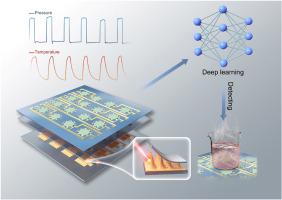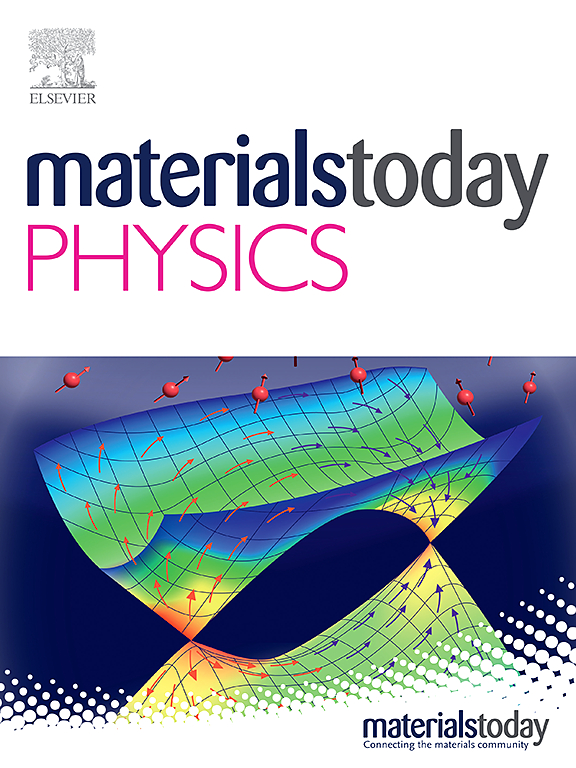采用阶梯式微锥结构和基于 Bi2Te3 薄膜的自供电温度压力传感阵列,用于深度学习辅助物体识别
IF 10
2区 材料科学
Q1 MATERIALS SCIENCE, MULTIDISCIPLINARY
引用次数: 0
摘要
灵活的温度-压力双模传感阵列可以检测包括力和热在内的多种类型信息,因此对物体分类、人机交互和人工智能等应用至关重要。然而,目前的传感器主要侧重于单参数和单点测量,同时缺乏持续稳定的电源。本研究通过将阶梯式微锥结构与热电材料相结合,开发出了灵活、自供电的温度压力传感阵列。这种阶梯分布的微结构设计能够在很宽的范围内进行有效的压力测量,并具有高灵敏度和快速响应的特点。通过采用基于 Bi2Te3 的高性能热电薄膜,在较宽的温度范围(35-173 °C)内实现了与温度无关的同步测量。这些温度和压力传感装置能够辨别温度和压力刺激,而不会相互干扰。此外,在深度学习的辅助下,这些双模传感阵列还能同时进行温度和压力的空间映射,证明它们有能力识别不同类型的物体,准确率超过 98%。因此,这项研究有望推动人机交互、人工智能和自供电电子皮肤的发展。本文章由计算机程序翻译,如有差异,请以英文原文为准。


Self-powered temperature pressure sensing arrays with stepped microcone structure and Bi2Te3-based films for deep learning-assisted object recognition
Flexible temperature-pressure bimodal sensing arrays can detect multiple types of information, including force and heat, making them crucial for applications such as object classification, human-machine interaction, and artificial intelligence. However, current sensors primarily focus on single-parameter and single-point measurements, while lacking a continuous and stable power supply. This study developed flexible, self-powered temperature-pressure sensing arrays by integrating a stepped microcone structure with thermoelectric materials. This stepped distribution microstructure design enabled effective pressure measurements across a wide range, with high sensitivity and fast response. Temperature-independent measurements were achieved synchronously over a wide temperature range (35–173 °C) by incorporating high-performance Bi2Te3-based thermoelectric films. These temperature and pressure sensing units can discern temperature and pressure stimuli without mutual interference. Furthermore, with the assistance of deep learning, these bimodal sensing arrays performed spatial mapping of temperature and pressure simultaneously, demonstrating their ability to identify different types of objects with an accuracy exceeding 98 %. Therefore, this study shows promise for advancing human-machine interaction, artificial intelligence, and self-powered electronic skins.
求助全文
通过发布文献求助,成功后即可免费获取论文全文。
去求助
来源期刊

Materials Today Physics
Materials Science-General Materials Science
CiteScore
14.00
自引率
7.80%
发文量
284
审稿时长
15 days
期刊介绍:
Materials Today Physics is a multi-disciplinary journal focused on the physics of materials, encompassing both the physical properties and materials synthesis. Operating at the interface of physics and materials science, this journal covers one of the largest and most dynamic fields within physical science. The forefront research in materials physics is driving advancements in new materials, uncovering new physics, and fostering novel applications at an unprecedented pace.
 求助内容:
求助内容: 应助结果提醒方式:
应助结果提醒方式:


